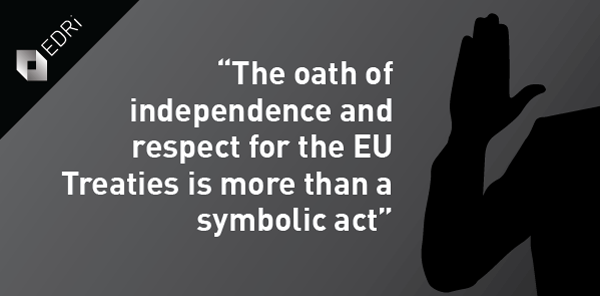ENDitorial: Commissioners’ oath – a broken promise on fundamental rights
On 3 May, 2010, the entire European Commission travelled to the Court of Justice of the European Union (CJEU) in Strasbourg to, for the first time in the history of the Union, take an oath that included a solemn declaration to “respect the Treaties and the Charter of Fundamental Rights of the European Union in the fulfilment of all [its] duties”. On that day, the President of the Commission stated that “the oath of independence [from Member States] and respect for the EU Treaties is more than a symbolic act”.
The Charter of Fundamental Rights, in line with all major human rights instruments, requires restrictions on fundamental rights to be necessary and prescribed by law. This is the most basic of obligations – without law there is no democratic process, without law there is no accountability, without law there is no predictability about what is permitted and what is prohibited.
The Charter is binding on Member States (when implementing EU law) and the Commission itself. It is not directly binding on the companies we rely on to host our websites, to host our social media posts, and to provide us with access to the internet. This offers a huge loophole for pushing “voluntary” restrictions that would not be permitted by law.
In October 2013, the Commission proposed its Telecoms Single Market (TSM) Regulation, where it tried and failed to include a loophole that would have allowed internet access providers “manage” traffic on their networks to prevent or impede (undefined) “serious crimes”. Restriction? Yes. Provided for by law? No. Predictable? No.
In June 2016, the Commission pushed internet companies into signing a “code of conduct” on “hate speech”. This code publicly demotes the rule of law to a secondary status behind the terms of service of internet companies. Complaints would have to be reviewed on the basis of the companies “rules and community guidelines” and only “where necessary”, national laws. Restriction? Yes. Provided for by law? No. Predictable? No.
In September 2016, the Commission published its proposal for a new Copyright Directive. It includes measures to undermine legal security of internet companies, making it easier to coerce them into “voluntarily” restricting content. The Directive places non-specific obligations on companies to “prevent” the upload of material (videos, text, audio, pictures… whatever) to their servers. Restriction? Yes. Provided for by law? Not clearly. Predictable? No.
Then the Commission launched its Communication on the implementation of the Digital Single Market (DSM) Strategy for Europe. What’s new? The abandonment of any measures to bring about a predictable legal framework in this area and new ambitions for lawless restrictions. These include demands for internet companies to engage in “proactive” searching for “illegal” content to remove, without defining who should assess whether the content is “illegal”, and to propose “technical solutions” for this. As a little joke, the text adds that this would be “in full respect of fundamental rights” – not “the Charter of Fundamental Rights”, but unspecified, lower case “fundamental rights”.
On 10 May, 2017, 24 Members of the European Parliament (MEPs), recognising the Commission’s abandonment of its obligations, signed a letter asking for a predictable legal framework.
The President of the European Commission said in 2010: “The oath of independence and respect for the EU Treaties is more than a symbolic act”. As it turned out, it was not even a symbolic act.

MEPs want notice and action directive: Open letter sent to Commissioner Ansip (10.05.2017)
https://marietjeschaake.eu/en/meps-want-notice-and-action-directive
Killing parody, killing memes, killing the internet? (08.05.2017)
https://edri.org/killing-parody-killing-memes-killing-the-internet/
ENDitorial: Transparency and law-making on EU copyright – mutually exclusive? (05.04.2017)
https://edri.org/transparency-and-law-making-mutually-exclusive/
The copyright reform: A guide for the perplexed (02.11.216)
https://edri.org/copyright-reform-guide-for-the-perplexed/
FAQ: EU Code of Conduct on illegal hate speech (02.11.2016)
https://edri.org/faq-code-conduct-illegal-hate-speech/
New documents reveal the truth behind the Hate Speech Code (07.09.2016)
https://edri.org/new-documents-reveal-truth-behind-hate-speech-code/
(Contribution by Joe McNamee, EDRi)


